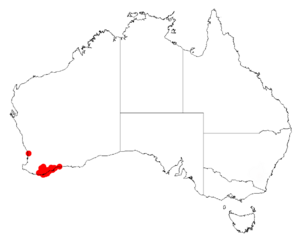Porongurup wattle facts for kids
Quick facts for kids Porongurup wattle |
|
|---|---|
| Scientific classification | |
| Genus: |
Acacia
|
| Species: |
leioderma
|
 |
|
| Occurrence data from AVH | |
The Acacia leioderma, also known as the Porongurup wattle, is a special type of wattle plant. It grows naturally only in a specific part of Western Australia. This area is called the lower Great Southern region, and it's mostly around the city of Albany. When a plant or animal is found only in one place, we say it is endemic to that area.
Contents
What Does the Porongurup Wattle Look Like?
The Porongurup wattle is a shrub that stands upright. It usually grows to be about 0.5 to 2 meters (1.6 to 6.6 feet) tall.
Stems and Leaves
- Its branches are reddish-brown and smooth. "Glabrous" means smooth, without hairs.
- These branches have clear ridges, like tiny ribs.
- It also has small leaf-like parts called stipules, which are about 2.5 to 4 millimeters long.
- The plant's leaves are actually "phyllodes." These are flattened leaf stalks that look and act like leaves. They are small, green, and look a bit like fern leaves.
Flowers
- The Porongurup wattle produces beautiful light golden flowers.
- You can see these flowers blooming for a long time, from April all the way through November.
Where Does the Porongurup Wattle Grow?
This unique wattle plant can be found across a wide area in Western Australia.
- Its range stretches west to a town called Walpole.
- To the east, it reaches as far as Esperance.
- Northward, it grows up to the Porongurup Range.
Preferred Habitat
The Porongurup wattle is not too picky about its soil. It can grow in:
- Sandy soils
- Loamy soils (a mix of sand, silt, and clay)
- Clay soils
You will often find it growing near granite outcrops, which are areas where granite rock sticks out of the ground.
Its Role in Nature
The Acacia leioderma is an important part of the natural environment, especially in the Porongurup Range.
- It is one of the main understorey species. The understorey is the layer of plants that grows beneath the main canopy of taller trees in a forest.
- It helps create a healthy habitat in the open forests found on the lower slopes of the Porongurup Range.

